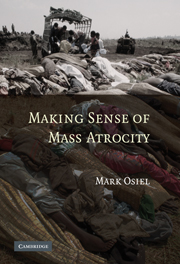Book contents
- Frontmatter
- Contents
- Dedication
- Preface
- Introduction
- 1 The Challenge of Prosecuting Mass Atrocity
- PART I LEGAL RULES AND THEIR PROBLEMS
- PART II THE POLITICAL CONTEXT OF LEGAL CHOICE
- PART III NEW POSSIBILITIES AND SOLUTIONS
- 9 Collective Sanctions for Collective Wrong
- 10 The Collective Responsibility of Military Officers
- 11 Being Economical with Amnesty
- Conclusion
- Index
- References
10 - The Collective Responsibility of Military Officers
Published online by Cambridge University Press: 15 September 2009
- Frontmatter
- Contents
- Dedication
- Preface
- Introduction
- 1 The Challenge of Prosecuting Mass Atrocity
- PART I LEGAL RULES AND THEIR PROBLEMS
- PART II THE POLITICAL CONTEXT OF LEGAL CHOICE
- PART III NEW POSSIBILITIES AND SOLUTIONS
- 9 Collective Sanctions for Collective Wrong
- 10 The Collective Responsibility of Military Officers
- 11 Being Economical with Amnesty
- Conclusion
- Index
- References
Summary
How, then, might the law help create and cultivate within modern armies the institutional characteristics enabling them to steer clear of mass atrocity? Much can be said in ready response to this question. First, militaries in many developed countries increasingly lure enlistees by promising instruction in technical skills marketable on departure. Those attracted on this basis are more susceptible to environmental clues about the changing costs and benefits of military membership than conscripts or those enlisting for patriotic motives.
Still, much of an officer's investment in years of demanding training becomes costs unrecoverable on leaving the corps. Most of the human capital acquired within combat positions in particular is firm-specific. It is unique to warfare; little demand exists for it in the peacetime economy. There also is no market among states for the services of a distinguished officer. It is axiomatic that he may sell these services only to his country of citizenship; few states need – or even insist on – covenants not to compete in employment contracts with their officers. Each state thus enjoys monopsony power over such laborers, whom it consequently binds with long-term contracts of adhesion. Private military contractors like Blackwater absorb only the smallest fraction of retired officers.
In short, alternative labor markets are few and mobility opportunities correspondingly limited. The high costs to an officer of exit from the corps enhance its collective capacity to sanction his deviance – hence also to deter it ex ante.
- Type
- Chapter
- Information
- Making Sense of Mass Atrocity , pp. 203 - 217Publisher: Cambridge University PressPrint publication year: 2009



